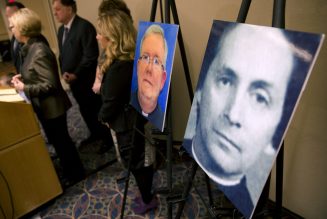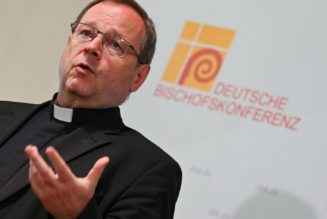By Dr. Jeff Mirus ( bio – articles – email ) | Mar 22, 2022
With the release of Praedicate Evangelium (“Preach the Gospel”), I guess we can expect great things for the Church. Or at least that’s what Catholics may have thought in 1588 when Sixtus V structured the Curia, or in 1908, 1967 and 1988 when three different twentieth-century saints took the trouble to restructure it. At least we have gone longer between major reshufflings this time. Pope John Paul II made significant reforms just twenty-one years after Paul VI did. Francis has waited thirty-four years, a 61% increase!
I don’t mean that restructuring serves no purpose. Adjustments must be made for shifting priorities and shifting workloads over time, and since the Church has arguably been on a downward slide in terms of both public influence and interior fidelity to the Gospel for at least the last hundred years, she has had good reason to try to make her mission more effective as “modern time” has increasingly ignored eternity. In any case, the sheer pace of change over the past century and a half—change which has generally undercut traditions of every kind and fostered a topsy-turvy model of ideological accommodation—has certainly seemed to call for more diverse and more responsive ecclesiastical structures.
But the reality is that the Church, in her leaders and in her members, has never really figured out how to preach the Gospel in a world so profoundly characterized by “modernism”, by which I mean a slavish addiction to whatever is new—a world which, in effect, finds meaning almost exclusively in change. Perhaps it was easier to learn in more stable eras that one cannot look to the ways of the world for happiness; but now, rapid change seems to offer hope always, no matter how often it disappoints. There is, at the very least, a powerful distraction from our deepest problems in sheer change.
In this atmosphere, the actual “content” of the Catholic Faith is often radically diminished in favor of a kind of lukewarm human sensibility. Consequently, whenever I consider Catholic governance, the first thing I wonder about is whether the guiding principles of Faith are actuating the entire operation—whether, in fact, there is real fidelity to the Gospel in the Church’s response to its commission to preach the Gospel.
Collaboration?
In his Catholic World News report on the promulgation of Praedicate Evangelium, Phil Lawler notes that the “Dicastery” for the Doctrine of the Faith “will now be charged with collaborating with other Vatican offices and with local churches on questions of doctrine”. It isn’t clear from the text itself that this collaboration is in any significant way juridically new; you’d have to check the wording in previous constitutions. But it is emphasized in Article 72:
On the measures to be adopted for the protection of faith and morals, in order to preserve their integrity from errors disclosed in any way, the Doctrinal Section [of the Dicastery for the Doctrine of the Faith] works in close contact with diocesan / eparchial Bishops, both as individuals and gathered in Episcopal Conferences or in particular Councils and in Eastern hierarchical Structures, in the exercise of their mission as authentic teachers and doctors of the faith, for which they are required to safeguard and promote the integrity of the same faith.
I focus on this duty because (as I think must by now go without saying), the peculiar Catholic crisis of our time consists in running the Church as if there were no specific content to the Catholic Faith that must be advanced and defended against the contrary opinions of modern culture. In this sense, huge numbers of bishops, priests, religious, deacons, parish leaders, politicians and ordinary lay people (at least throughout the secularized West) downplay the elements of Catholic teaching which flatly contradict prevailing cultural ideas while emphasizing primarily those aspects of Catholic life that find broad cultural favor. Thus we hear much about overcoming racism, caring for the environment, and assisting the poor—duties which are honored 99% of the time in our dominant culture, even if at times only in the breach—and we hear very little about sexual morality, fidelity in marriage, and the primary Christian obligation to form, support and educate strong, faithful, generous and counter-cultural Christian families.
In any case, the emphasis on the need for the Dicastery for the Doctrine of the Faith to “work in close contact” with the bishops is a very good thing, unless this degenerates into just another way of diffusing responsibility. The bishops remain the primary bearers of the prophetic mission in their territories, and they therefore bear the first responsibility for the integrity of the Christian Faith, as disclosed through Divine Revelation, the natural law, and previous clarifications by the Church’s Magisterium. Nor is this some sort of marginal activity to be tolerated out of a dim sense of necessity. Rather, the proclamation of the Faith in its fulness is the chief responsibility—the defining and distinguishing element—of preaching the Gospel, which is the very theme of this latest Apostolic Constitution. After all, the final words of Our Lord to His disciples were these:
All authority in heaven and on earth has been given to me. Go therefore and make disciples of all nations, baptizing them in the name of the Father and of the Son and of the Holy Spirit, teaching them to observe all that I have commanded you; and lo, I am with you always, to the close of the age. [Mt 28:18-20]
An old expression has it exactly right: The faith is far more than its specific doctrines, but it is never less. It is the “doctrine of the faith”, which is to be especially safeguarded by the Dicastery which bears this name, because its purpose is precisely to ensure the integrity of our understanding of Christ’s mission in the world.
In connection with this idea of “collaboration”, then, I note that the specific action of the Dicastery should never be the trigger for episcopal responsiveness in protecting the deposit of Faith. In other words, no bishop should be in the position of ignoring false teaching among the Catholic professors, ecclesiastical personnel, and leading lights of his diocese, acting only if and when the Dicastery steps in to resolve the most egregious cases which are brought to its attention on the winds of publicity. No, this collaboration, this mandate to “work in close contact” with the bishops ought to mean that difficult cases are brought to the attention of the Dicastery in the normal course of the local bishop’s protection of the content of the Faith in all the ordinary situations which he thoroughly understands. And then, when difficult cases are clarified by the Dicastery, the bishop would take ownership of the clarification to further protect the Faith in his own diocese.
Short of this kind of working “in close contact”—on the assumption that the Dicastery is an important resource when and where it is needed—the deposit of faith will never be protected in each diocese any more than it is now.
Praedicate Evangelium: Preach the Gospel
The term “central government” in the context of the Church is inappropriate in any but the most minimal sense. The Church is governed by the episcopal successors of the apostles with the successor of St. Peter at their head. The Curia serves two and only two essential functions. It assists the Pope in the discharge of his immense responsibilities as the Vicar of Christ at the head of a large worldwide Church. And it provides, under papal supervision, a collection of resources which the bishops can draw upon when they need the assistance of Peter in grappling with the problems in their own dioceses.
Praedicate Evangelium could foster the true synodality demanded by this episcopal model, in which by their very determination to discharge their offices well, bishops find an authentically Catholic “way together” (which is the meaning of the word “synod”). But if it merely reflects what we might call a “false synodality of endless discussion” which keeps bishops in limbo while the Pope says and does (or does not say and does not do) whatever he pleases, then it will mark a further spread of paralysis in the Church, just as the current Synodal Path seems to have done thus far. Again, if the collaborative tone used in this latest Apostolic Constitution signals resourcefulness rather than paralysis, then bishops will take greater responsibility for the faith in their own dioceses—and will be judged in Rome on the steps they either do or do not take, so that a serious failure to preach the Gospel can be corrected if necessary by a more worthy bishop the next time around.
Preaching the Gospel requires a clear, specific, unified, vibrant and sacrificial Faith. The Curia ought to be an important resource for bishops in those few cases in which they lack the understanding, the ability or the authority to resolve particular issues. The inaction of the Curia should never be an excuse to do nothing or to do the wrong thing, any more than the action of the Curia should be an excuse to disclaim any responsibility. Every bishop should both defend and advance the Catholic faith as the very core of his mission, and must recognize that curial structures make comparatively little difference in the exercise of that responsibility.
As St. Paul so forcefully reminds us, the full Gospel of Christ must be preached before it can be received and lived:
For, “every one who calls upon the name of the Lord will be saved.” But how are men to call upon him in whom they have not believed? And how are they to believe in him of whom they have never heard? And how are they to hear without a preacher? And how can men preach unless they are sent? …So faith comes from what is heard, and what is heard comes by the preaching of Christ. [Rom 10:13-17]
Bishops are first and foremost sent; they in turn send their priests to make up for the limitations of their own presence in space and time. In receiving an Apostolic Constitution named “Preach the Gospel”, it is fitting to conclude by emphasizing this essential point to each and every Catholic. For no fewer than seven times in the gospels does Our Lord say: “He who has ears to hear, let him hear.”
Sound Off! CatholicCulture.org supporters weigh in.
All comments are moderated. To lighten our editing burden, only current donors are allowed to Sound Off. If you are a current donor, log in to see the comment form; otherwise please support our work, and Sound Off!

Join Our Telegram Group : Salvation & Prosperity








